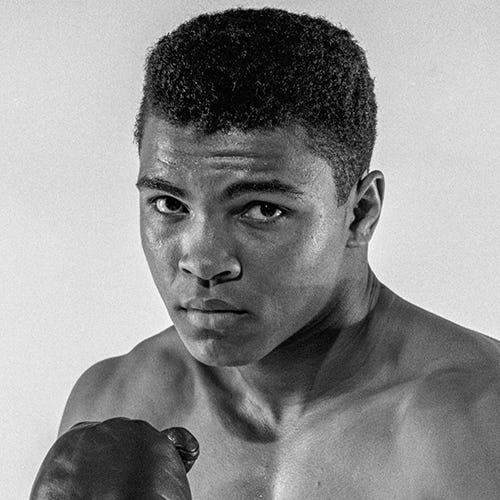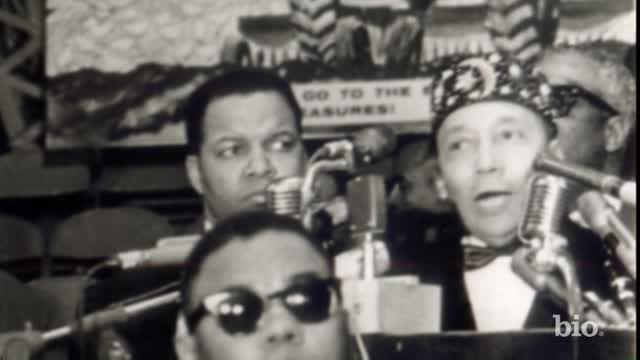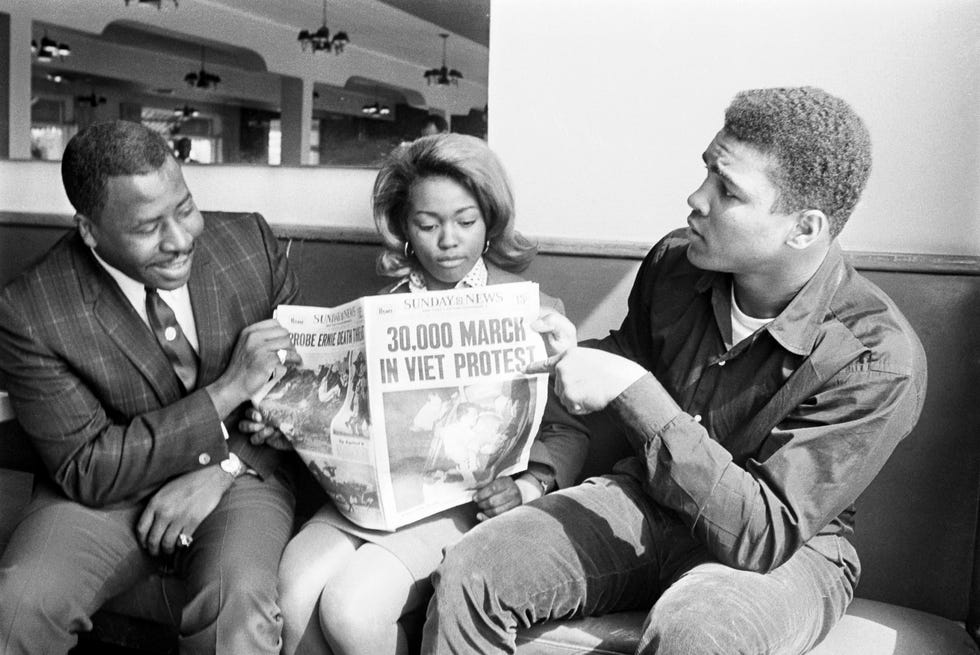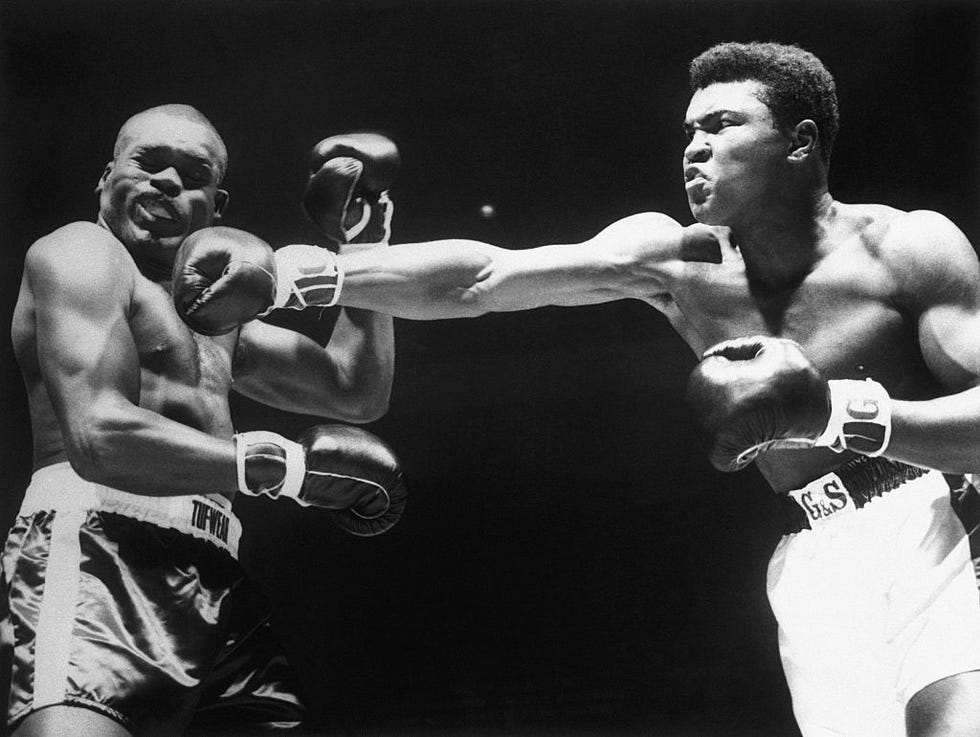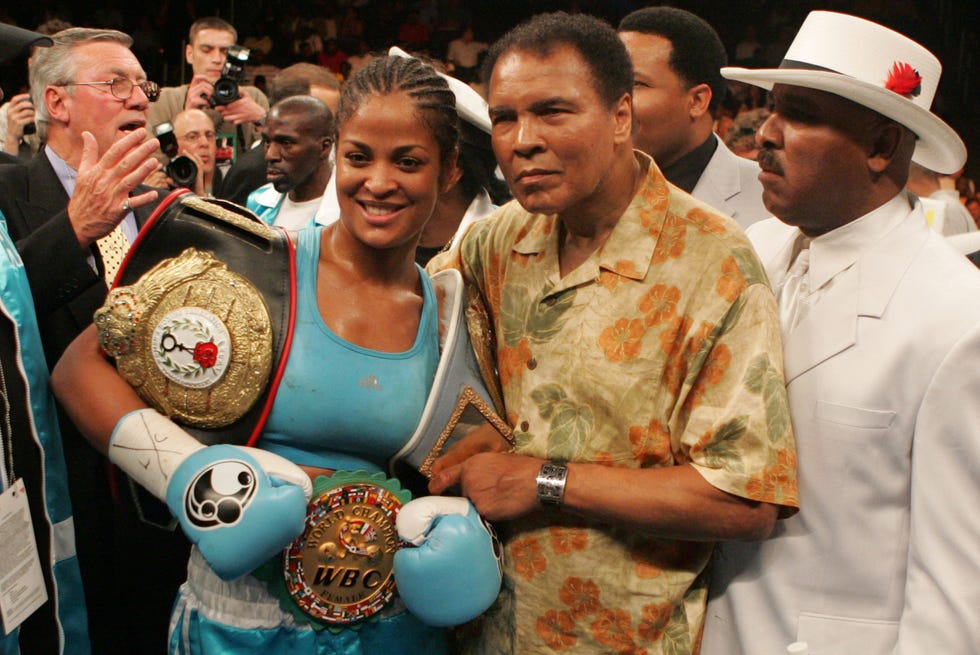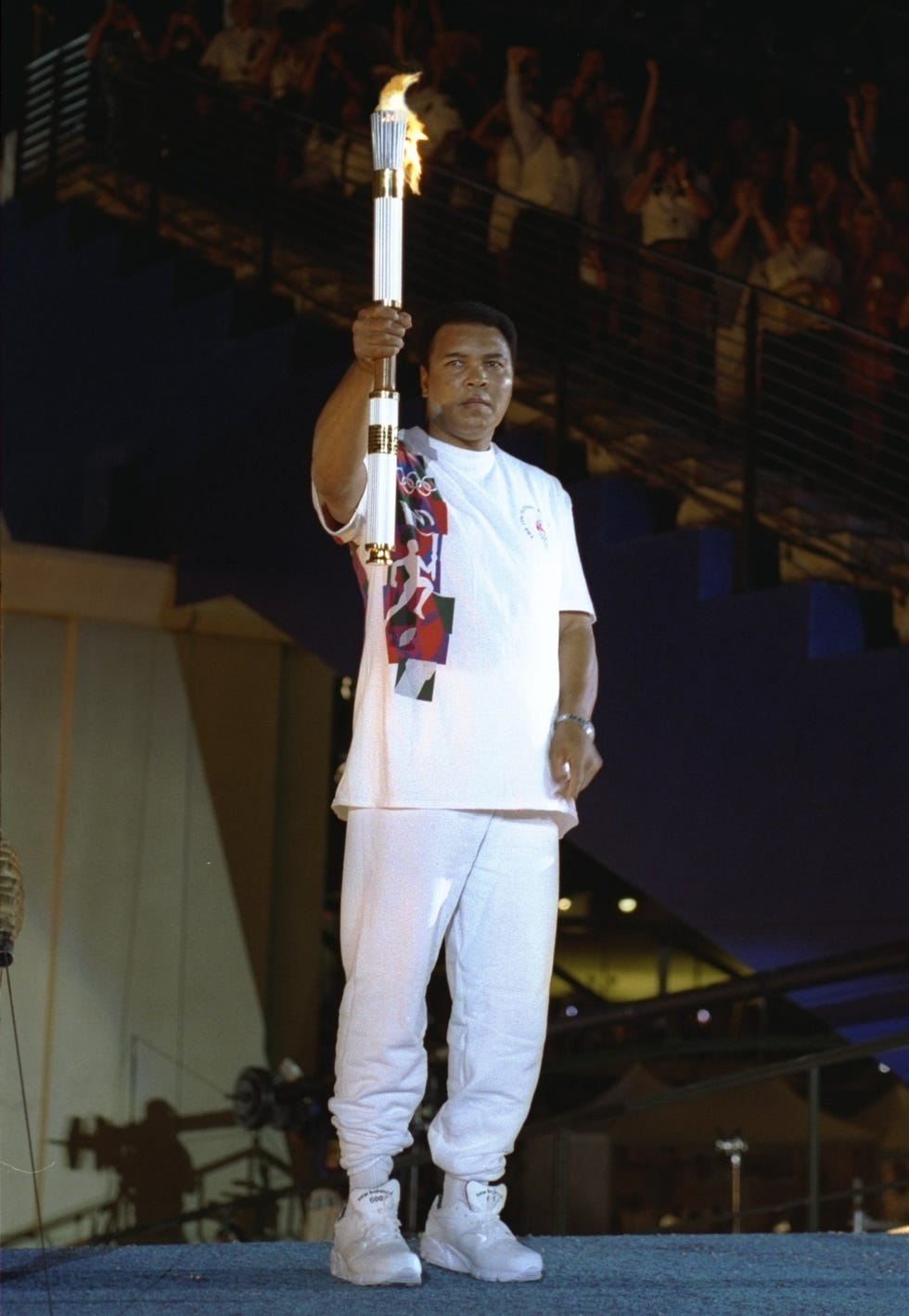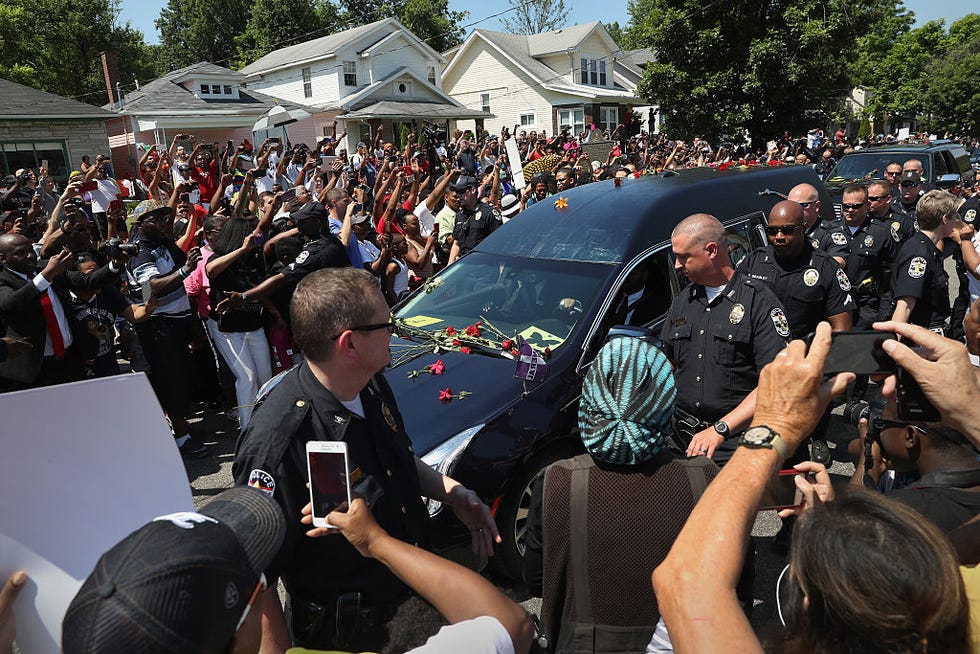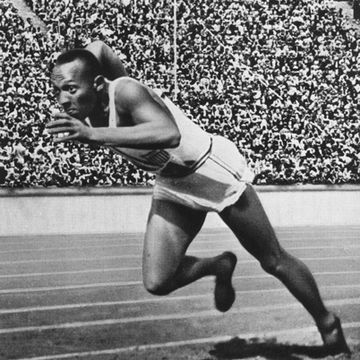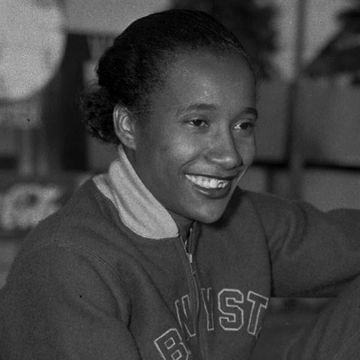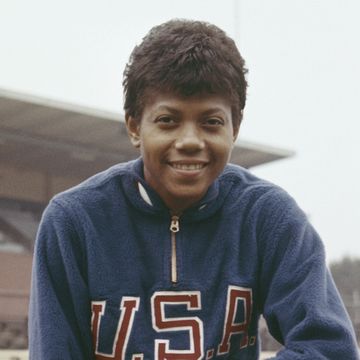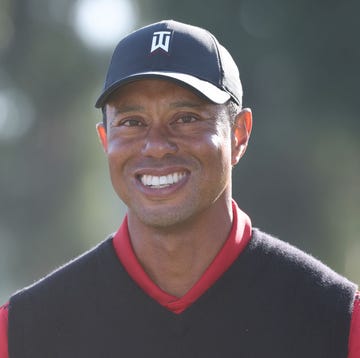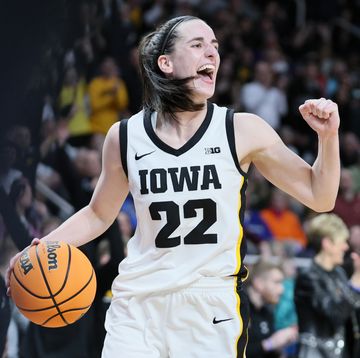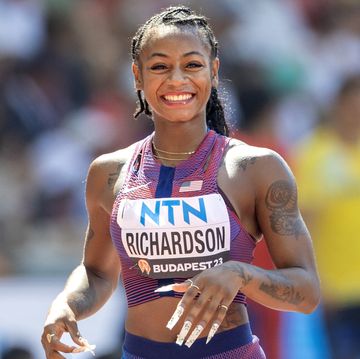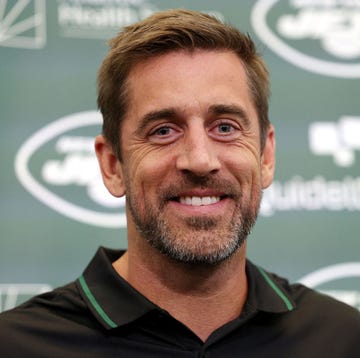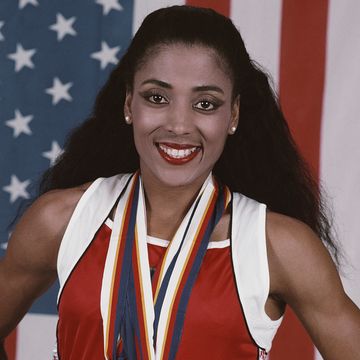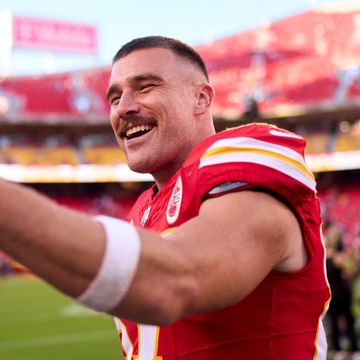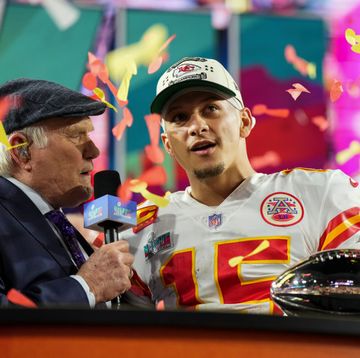Jump to:
- Who Was Muhammad Ali?
- Quick Facts
- Early Life
- Olympic Gold
- Relationship With Malcolm X and Conversion to Islam
- Vietnam War Protest and Supreme Court Case
- Muhammad Ali’s Boxing Record
- Wives, Children, and Family Boxing Legacy
- Parkinson’s Diagnosis
- Philanthropy
- Awards
- Muhammad Ali Center
- Declining Health and Death
- Funeral and Memorial Service
- Movies about Muhammad Ali
- Quotes
1942-2016
Who Was Muhammad Ali?
Muhammad Ali was a boxer, philanthropist, and social activist who is universally regarded as one of the greatest athletes of the 20th century. Ali became an Olympic gold medalist in 1960 and the world heavyweight boxing champion in 1964. Following his suspension for refusing military service in the Vietnam War, Ali reclaimed the heavyweight title two more times during the 1970s, winning famed bouts against Joe Frazier and George Foreman along the way. Ali retired from boxing in 1981 and devoted much of his time after to philanthropy. He earned the Presidential Medal of Freedom in 2005.
Quick Facts
FULL NAME: Cassius Marcellus Clay Jr.
BORN: January 17, 1942
DIED: June 3, 2016
BIRTHPLACE: Louisville, Kentucky
SPOUSES: Sonji Roi (1964-1965), Belinda Boyd (1967-1977), Veronica Porché (1977-1986), and Yolanda Williams (1986-2016)
CHILDREN: Maryum, Jamillah, Rasheda, Muhammad Jr., Miya, Khaliah, Hana, Laila Ali, and Asaad
ASTROLOGICAL SIGN: Capricorn
Early Life
Muhammad Ali was born on January 17, 1942, in Louisville, Kentucky. His birth name was Cassius Marcellus Clay Jr.
At an early age, young Clay showed that he wasn’t afraid of any bout—inside or outside of the ring. Growing up in the segregated South, he experienced racial prejudice and discrimination firsthand.
At the age of 12, Clay discovered his talent for boxing through an odd twist of fate. After his bike was stolen, Clay told police officer Joe Martin that he wanted to beat up the thief. “Well, you better learn how to fight before you start challenging people,” Martin reportedly told him at the time. In addition to being a police officer, Martin also trained young boxers at a local gym.
Clay started working with Martin to learn how to spar and soon began his boxing career. In his first amateur bout in 1954, he won the fight by split decision. Clay went on to win the 1956 Golden Gloves tournament for novices in the light heavyweight class. Three years later, he won the National Golden Gloves Tournament of Champions, as well as the Amateur Athletic Union’s national title for the light heavyweight division.
Clay attended mostly Black public schools, including Central High School in Louisville from 1956 to 1960. Clay often daydreamed in class and shadowboxed in the halls—he was training for the 1960 Olympics at the time—and his grades were so bad that some of his teachers wanted to hold him back from graduation. However, the school’s principal Atwood Wilson could see Clay’s potential and opposed this, sarcastically asking the staff, “Do you think I’m going to be the principal of a school that Cassius Clay didn’t finish?”
Olympic Gold
In 1960, Clay won a spot on the U.S. Olympic boxing team and traveled to Rome to compete. At 6 feet, 3 inches tall, Clay was an imposing figure in the ring, but he also became known for his lightning speed and fancy footwork. After winning his first three bouts, Clay defeated Zbigniew Pietrzkowski of Poland to win the light heavyweight Olympic gold medal.
After his Olympic victory, Clay was heralded as an American hero. He soon turned professional with the backing of the Louisville Sponsoring Group and continued overwhelming all opponents in the ring.
Relationship With Malcolm X and Conversion to Islam
Clay met charismatic Nation of Islam minister Malcolm X at a rally in Detroit in June 1962. Floored by Malcolm X’s fearlessness as an orator, the two developed a friendship and Clay became more involved in the Black Muslim group. Malcolm X even assigned an associate to help manage Clay’s day-to-day affairs.
In 1964, Malcolm X brought his family to visit Clay while he trained in Florida for his February 25 title fight against Sonny Liston. Clay’s victory over Liston earned him his first world heavyweight boxing championship. Following the win, the two held an evening of reflection in a hotel room with Jim Brown and Sam Cooke that became the inspiration for the One Night in Miami stage play and 2020 drama film.
The next morning, on February 26, Clay announced his affiliation with the Nation of Islam. At first, he called himself Cassius X before settling on the name Muhammad Ali. Surprisingly, his allegiances were with supreme leader Elijah Muhammad and not the exiled Malcolm X. Ali and Malcolm’s friendship quickly fractured, and the two went their separate ways by that spring.
Ali showed little remorse upon Malcolm X’s murder on February 21, 1965, but admitted in his 2005 memoir Soul of a Butterfly: “Turning my back on Malcolm was one of the mistakes that I regret most in my life.”
The boxer eventually converted to orthodox Islam during the 1970s.
Vietnam War Protest and Supreme Court Case
Ali started a different kind of fight with his outspoken views against the Vietnam War. Drafted into the military in April 1967, he refused to serve on the grounds that he was a practicing Muslim minister with religious beliefs that prevented him from fighting. He was arrested for committing a felony and almost immediately stripped of his world title and boxing license.
The U.S. Justice Department pursued a legal case against Ali and denied his claim for conscientious objector status. He was found guilty of violating Selective Service laws and sentenced to five years in prison in June 1967 but remained free while appealing his conviction.
Unable to compete professionally in the meantime, Ali missed more than three prime years of his athletic career. Following his suspension, Ali found refuge on Chicago’s South Side, where he lived from the mid-1960s through the late 1970s. He continued training, formed amateur boxing leagues, and fought whomever he could in local gyms.
Finally granted a license to fight in 1970 in Georgia, which did not have a statewide athletic commission, Ali returned to the ring at Atlanta’s City Auditorium on October 26 with a win over Jerry Quarry. A few months later, the U.S. Supreme Court overturned his conviction in June 1971, allowing Ali to fight on a regular basis.
Muhammad Ali’s Boxing Record
Ali had a career record of 56 wins, five losses, and 37 knockouts before his retirement in 1981 at the age of 39.
Often referring to himself as “The Greatest,” Ali was not afraid to sing his own praises. He was known for boasting about his skills before a fight and for his colorful descriptions and phrases. In one of his more famously quoted descriptions, Ali told reporters that he could “float like a butterfly, sting like a bee” in the boxing ring.
A few of his more well-known bouts include the following:
Sonny Liston
After winning gold at the 1960 Olympics, Ali took out British heavyweight champion Henry Cooper in 1963. He then knocked out Sonny Liston on February 25, 1964, to become the heavyweight champion of the world.
Joe Frazier
On March 8, 1971, Ali took on Joe Frazier in what has been called the “Fight of the Century.” Frazier and Ali went toe-to-toe for 14 rounds before Frazier dropped Ali with a vicious left hook in the 15th. Ali recovered quickly, but the judges awarded the decision to Frazier, handing Ali his first professional loss after 31 wins.
After suffering a loss to Ken Norton, Ali beat Frazier in a rematch on January 28, 1974.
In 1975, Ali and Frazier locked horns again for their grudge match on October 1 in Quezon City, Philippines. Dubbed the “Thrilla in Manila,” the bout nearly went the distance, with both men delivering and absorbing tremendous punishment. However, Frazier’s trainer threw in the towel after the 14th round, giving the hard-fought victory to Ali.
George Foreman
Another legendary Ali fight took place on October 30, 1974, against undefeated heavyweight champion George Foreman. Billed as the “Rumble in the Jungle,” the bout was organized by promoter Don King and held in Kinshasa, Zaire.
For once, Ali was seen as the underdog to the younger, massive Foreman, but he silenced his critics with a masterful performance. He baited Foreman into throwing wild punches with his “rope-a-dope” technique, before stunning his opponent with an eighth-round knockout to reclaim the heavyweight title.
Leon Spinks
After losing his title to Leon Spinks on February 15, 1978, Ali defeated him months later in a rematch on September 15. Ali became the first boxer to win the heavyweight championship three times.
Larry Holmes
Following a brief retirement, Ali returned to the ring to face Larry Holmes on October 2, 1980, but was overmatched against the younger champion.
Following one final loss in 1981, to Trevor Berbick, the boxing great retired from the sport at age 39.
Wives, Children, and Family Boxing Legacy
Ali was married four times and had nine children, including two children—daughters Miya and Khaliah—he fathered outside of marriage.
Ali married his first wife, Sonji Roi, in 1964. They divorced a little more than one year later when she refused to adopt the Nation of Islam dress and customs.
Ali married his second wife, 17-year-old Belinda Boyd, in 1967. Boyd and Ali had four children together: Maryum, born in 1969; Jamillah and Rasheda, both born in 1970; and Muhammad Ali Jr., born in 1972. Boyd and Ali’s divorce was finalized in 1977.
At the same time Ali was married to Boyd, he traveled openly with Veronica Porché, who became his third wife in 1977. The pair had two daughters together, Hana and Laila Ali. The latter followed in Ali’s footsteps by becoming a champion boxer. Porché and Ali divorced in 1986.
Ali married his fourth and final wife Yolanda, who went by Lonnie, in 1986. The pair had known each other since Lonnie was just 6 and Ali was 21; their mothers were best friends and raised their families on the same street. Ali and Lonnie had one son together, Asaad, and remained married until Ali’s death.
Grandchildren
Rasheda’s son Nico Walsh Ali became a boxer like his grandfather and aunt. In 2021, he signed a deal with legendary Top Rank promoter Bob Arum, who promoted 27 of Muhammad Ali’s bouts. He won his first eight professional fights, according to database BoxRec.
Nico’s brother, Biaggio Ali Walsh, was a star football running back, helping lead national powerhouse Bishop Gorman High School in Las Vegas to the top of the USA Today rankings from 2014 through 2016. He played collegiately at the University of California, Berkeley and the University of Nevada, Las Vegas before becoming an amateur mixed martial artist.
The brothers have drawn the attention of social media celebrity Jake Paul, a novice boxer who has said he’d like to fight both and “erase” them.
One of Ali’s other grandsons, Jacob Ali-Wertheimer, competed in NCAA track and field at Harvard University and graduated in 2021.
Parkinson’s Diagnosis
In 1984, Ali announced that he had Parkinson’s disease, a degenerative neurological condition. Despite the progression of Parkinson’s and the onset of spinal stenosis, he remained active in public life.
Ali raised funds for the Muhammad Ali Parkinson Center in Phoenix, Arizona. And he was on hand to celebrate the inauguration of the first Black president in January 2009, when Barack Obama was sworn into office.
Philanthropy
In his retirement, Ali devoted much of his time to philanthropy. Over the years, Ali supported the Special Olympics and the Make-A-Wish Foundation, among other organizations. In 1996, he lit the Olympic cauldron at the Summer Olympic Games in Atlanta, an emotional moment in sports history.
Ali traveled to numerous countries, including Mexico and Morocco, to help out those in need. In 1998, he was chosen to be a United Nations Messenger of Peace because of his work in developing nations.
Awards
In 2005, Ali received the Presidential Medal of Freedom from President George W. Bush.
Ali also received the President’s Award from the NAACP in 2009 for his public service efforts. Other recipients of the award have included include Ella Fitzgerald, Venus and Serena Williams, Kerry Washington, Spike Lee, John Legend, Rihanna, and LeBron James.
Muhammad Ali Center
Ali opened the Muhammad Ali Center, a multicultural center with a museum dedicated to his life and legacy, in his hometown of Louisville in 2005.
“I am an ordinary man who worked hard to develop the talent I was given,” he said. “Many fans wanted to build a museum to acknowledge my achievements. I wanted more than a building to house my memorabilia. I wanted a place that would inspire people to be the best that they could be at whatever they chose to do, and to encourage them to be respectful of one another.”
Declining Health and Death
Ali lived the final decade of his live in the Phoenix suburb of Paradise Valley, Arizona.
A few years before his death, Ali underwent surgery for spinal stenosis, a condition causing the narrowing of the spine, which limited his mobility and ability to communicate. In early 2015, he battled pneumonia and was hospitalized for a severe urinary tract infection.
Ali died on June 3, 2016, in Scottsdale, Arizona, after being hospitalized for what was reportedly a respiratory issue. He was 74 years old.
Funeral and Memorial Service
Years before his passing, Ali had planned his own memorial services, saying he wanted to be “inclusive of everyone, where we give as many people an opportunity that want to pay their respects to me,” according to a family spokesman.
The three-day event, which took place in Ali’s hometown of Louisville, included an “I Am Ali” public arts festival, entertainment and educational offerings sponsored by the city, an Islamic prayer program, and a memorial service.
Prior to the memorial service, a funeral procession traveled 20 miles through Louisville, past Ali’s childhood home, his high school, the first boxing gym where he trained, and along Ali Boulevard as tens of thousands of fans tossed flowers on his hearse and cheered his name.
The champ’s memorial service was held at the KFC Yum Center arena with close to 20,000 people in attendance. Speakers included religious leaders from various faiths: Attallah Shabazz, Malcolm X’s eldest daughter; broadcaster Bryant Gumbel; former President Bill Clinton; comedian Billy Crystal; Ali’s daughters Maryum and Rasheda; and his widow, Lonnie.
“Muhammad indicated that when the end came for him, he wanted us to use his life and his death as a teaching moment for young people, for his country, and for the world,” Lonnie said. “In effect, he wanted us to remind people who are suffering that he had seen the face of injustice—that he grew up during segregation and that during his early life he was not free to be who he wanted to be. But he never became embittered enough to quit or to engage in violence.”
Clinton spoke about how Ali found self-empowerment: “I think he decided, before he could possibly have worked it all out, and before fate and time could work their will on him, he decided he would not ever be disempowered. He decided that not his race, nor his place, the expectations of others—positive, negative, or otherwise—would strip from him the power to write his own story.”
Crystal, who was a struggling comedian when he became friends with Ali, said of the boxing legend: “Ultimately, he became a silent messenger for peace, who taught us that life is best when you build bridges between people, not walls.”
Pallbearers included Will Smith, who once portrayed Ali on film, and former heavyweight champions Mike Tyson and Lennox Lewis. Ali is buried at the Cave Hill National Cemetery in Louisville.
Ali’s stature as a legend continues to grow even after his death. He is celebrated not only for his remarkable athletic skills but for his willingness to speak his mind and his courage to challenge the status quo.
Movies about Muhammad Ali
Ali played himself in the 1977 film The Greatest, which explored parts of his life such as his rise to boxing fame, conversion to Islam, and refusal to serve in Vietnam.
The 1996 documentary When We Were Kings explores Ali’s training process for his 1974 fight against George Foreman and the African political climate at the time. Directed by Leon Gast, the film won an Academy Award for Best Documentary Feature.
Actor Will Smith played Ali in the biopic film Ali, released in 2001. For the performance, Smith received an Academy Award nomination for Best Actor.
Ali’s relationship with Malcolm X is explored in the fictionalized 2020 drama One Night in Miami and the 2021 documentary Blood Brothers: Malcolm X and Muhammad Ali.
Quotes
- The man who views the world at 50 the same as he did at 20 has wasted 30 years of his life.
- It isn’t the mountains ahead to climb that wear you out; it’s the pebble in your shoe.
- I’m gonna float like a butterfly, sting like a bee. The hands can’t hit what the eyes can’t see.
- I am an ordinary man who worked hard to develop the talent I was given.
- I’m the champion of the world. I’m the greatest thing that ever lived. I’m so great I don’t have a mark on my face. I shook up the world! I shook up the world!
- If Clay says a mosquito can pull a plow, don’t ask how—Hitch him up!
- You get the impression while watching him fight that he plays cat and mouse, then turns out the light.
- The real enemy of my people is here. I will not disgrace my religion, my people, or myself by becoming a tool to enslave those who are fighting for their own justice, freedom, and equality.
- Religions all have different names, but they all contain the same truths. I think the people of our religion should be tolerant and understand people believe different things.
- It’s just a job. Grass grows, birds fly, waves pound the sand. I beat people up.
- I set out on a journey of love, seeking truth, peace, and understanding. l am still learning.
- Truly great people in history never wanted to be great for themselves.
- At night when I go to bed, I ask myself, “If I don’t wake up tomorrow, would I be proud of how I lived today?”
- This is the story about a man with iron fists and a beautiful tan.
Fact Check: We strive for accuracy and fairness. If you see something that doesn’t look right, contact us!..
The Biography.com staff is a team of people-obsessed and news-hungry editors with decades of collective experience. We have worked as daily newspaper reporters, major national magazine editors, and as editors-in-chief of regional media publications. Among our ranks are book authors and award-winning journalists. Our staff also works with freelance writers, researchers, and other contributors to produce the smart, compelling profiles and articles you see on our site. To meet the team, visit our About Us page: https://www.biography.com/about/a43602329/about-us
Tyler Piccotti first joined the Biography.com staff as an Associate News Editor in February 2023, and before that worked almost eight years as a newspaper reporter and copy editor. He is a graduate of Syracuse University. When he's not writing and researching his next story, you can find him at the nearest amusement park, catching the latest movie, or cheering on his favorite sports teams.
